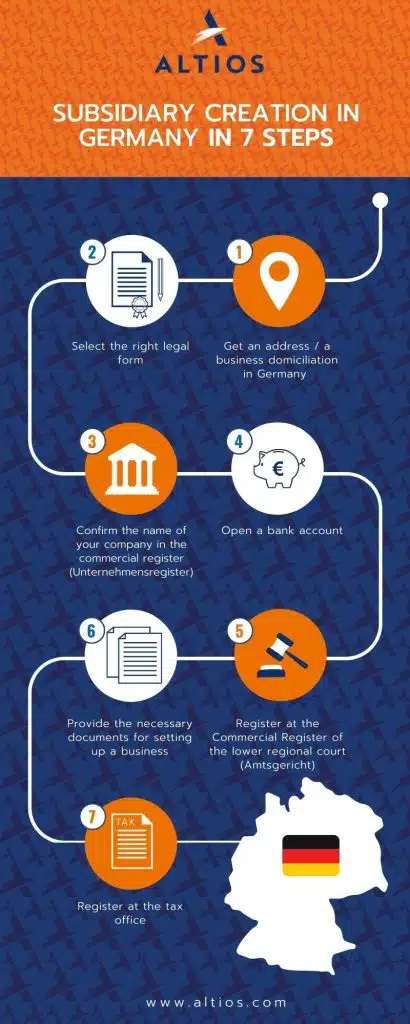The establishment of a subsidiary is the preferred way to set up a company in Germany, as it is a genuine and legally independent company under German law. It is the most advanced form of establishment for carrying out the economic activity with a strong grip on the German market, due to the fact that it has a legal structure the Germans know, which is reassuring to them.
Here are the 7 steps we have compiled to help you set up your subsidiary in Germany:

Getting an address/ business domiciliation in Germany
The first thing to do is to have an address or a business domiciliation in Germany, before taking any steps in the country, to be able to start the process of creating a subsidiary.
Selecting the right legal form
German company law offers different legal structures for setting up a German subsidiary, which enables you to choose one depending on your business purposes.
Here are the main types of companies in Germany:
- Gesellschaft mit beschränkter Haftung (GmbH): Limited Liability Company: This is the most widely used legal form for corporations. Here, the shareholders are not personally liable for the debts of the company. It does require €25,000 of startup capital, however, €12,500 of which must be present at the registration stage.
- Aktiengesellschaft (AG): Stock Corporation: It requires at least five founding shareholders and operates through a board of directors (Vorstand), which makes mutual decisions. The AG comes into existence upon registration in the commercial register (Handelsregister). The application must be signed by the founding shareholders, the members of the supervisory board, and the management board before a notary. In addition, an AG must be registered with the local trade office (Gewerbe- oder Ordnungsamt).
- Offene Handelsgesellschaft (oHG): General Commercial Partnership: This is the classic partnership form for small and medium-sized enterprises (SMEs). In order to establish an oHG, two or more partners must conclude a partnership agreement, who are all jointly and severally liable for the oHG’s debts and liabilities. The oHG must be entered in the commercial register and registered with the local trade office.
- Kommanditgesellschaft (KG): Limited partnership: It is a legal form related to the oHG, but with the option of limiting the liability of some of the partners. A KG is established when a partnership agreement between two or more partners (including at least one limited and one unlimited partner) is concluded and exists once it has been entered in the commercial register.
- GmbH & Co. KG: a limited partnership (KG) in which the general partner (Komplementär) is a limited liability company (GmbH): The GmbH & Co.KG is established through the conclusion of a partnership agreement between the general partner and the limited partners.
- Tochtergesellschaft : Subsidiary: These are companies separate from their parent company, with a certain autonomy, without being independent. These companies have their own management.
- Zweigniederlassung: Branche: These are dependent companies with a central administration. Subsidiaries and branches are different and must be noted differently in the commercial register
Confirm the name of your company with the commercial register (Unternehmensregister)
You must make sure that you can use the name of the company you want. Thanks to the Unternehmensregister website, you can easily and quickly search for already registered company names and check that yours is unique.
Open a bank account
You must then open your own bank account in Germany. Opening a bank account does not involve a lot of red tapes, as it is done in accordance with standard international practice. Many German banks allow you to set up accounts online, which means you can do this step remotely – but be aware that most bank websites will be entirely in German. Make sure you provide proof of your identity – this can be done at your local post office, or you can ask a notary or lawyer to help you check your identity.
You can also make your request by going to the bank in person. In this case, you or your representative may be asked to present your passport or identity card, as well as a Meldebescheinigung (“certificate of registration” – your proof of residence in Germany).
Provide the necessary documents for setting up a business
The legal form of the company determines the necessary documents and evidence. In all cases, the following administrative formalities must be carried out:
- A declaration of existence must be made to the Gewerbeamt for the creation of any commercial or industrial exploitation.
- A declaration to the tax authorities (Finanzamt)
- A declaration to the competent Statistische Landesamt
- A declaration to the Labour Office (Arbeitsamt) if employees are hired.
- A declaration to the Social Security bodies and the relevant professional association (Berufsgenossenschaft)
- Registration with the professional chamber to which the company belongs
It should be noted that there are certain sectors of activity in Germany for which specific authorization is required (e.g. transports, estate agencies, surveillance companies, etc.). The Gewerbeamt is likely to indicate any additional steps to be taken.
Registration in the Commercial Register of the lower regional court (Amtsgericht)
Next step: Your entry in the Commercial Register of the lower regional court (Amtsgericht).
You must submit your documents to the Commercial Register through the notary. If the essential information about your registered company (company name and registered office, authorized representatives, legal form, as well as share capital or shares) is accepted, your new company will be published on the Handelsregister website.
The final step is to register your new business with the local tax office within four weeks of opening and within one month of certification of the articles of association by a notary.
Registering with the tax office
You now know the key steps to setting up your subsidiary!
ALTIOS is always at your disposal to guide you through all the steps involved in setting up a new German company or expanding an existing one. We will be happy to put you in touch with the appropriate lawyers, tax advisors, attorneys, and other experts needed to realize your investment project.
Please do not hesitate to call us on +49 (0)69 24 74 102 – 14 or contact our business developer Juliette Cabot at j.cabot@altios.com








